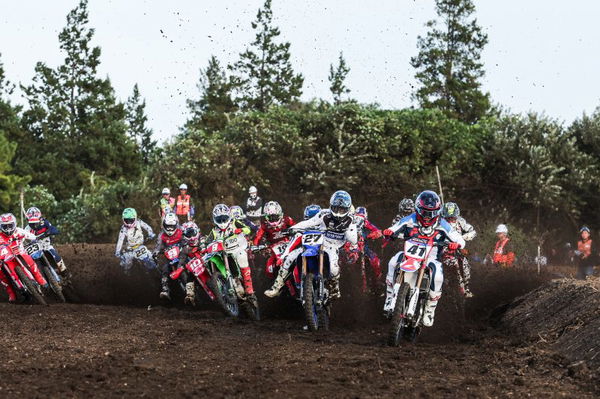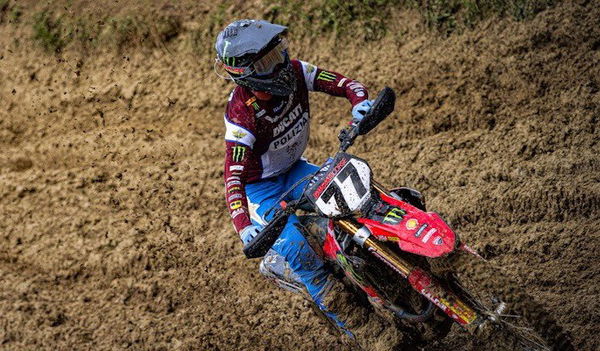Vanessa Ruck: “My goal is to not die in the desert…”
Vanessa Ruck has become a well-known figure in the world of adventure biking, but her biggest challenge is to come: the Africa Eco Race
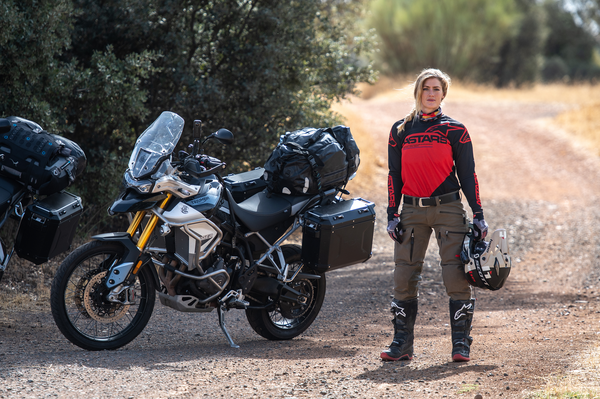
The Africa Eco Race is not the most famous rally in the world, but it does follow perhaps the most famous route, generally speaking, as it aims to replicate the original Paris-Dakar rally. Vanessa Ruck will be taking part in the AER for the first time in 2024.
It won’t be Ruck’s first attempt at a motorcycle rally. In fact, she’s becoming quite experienced in the discipline, having competed in the 1000 Dunas, Morocco Desert Challenge, and Tunisian Desert Challenge, to name a few.
But the Africa Eco Race is a tough challenge on Ruck’s horizon. “My goal is to not die in the desert, and make the finish line,” Ruck said with a laugh. I spoke with her back at the end of August at the Women in Moto Show in Uttoxeter. Even then, more than four months out from the beginning of the AER, she was “having nightmares about [it].”
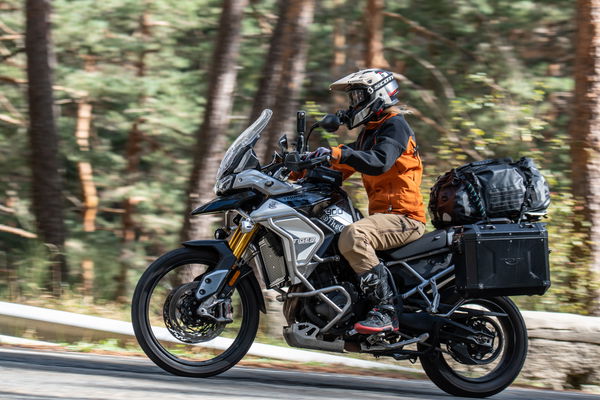
But, despite the anxious fear of what is to come, the AER is an important rally to Ruck. “There’s a number of reasons why I’ve been attracted to the Africa Eco Race,” she said, “primarily, [it] is really the original route of the Dakar.”
The Paris-Dakar Rally no longer has anything to do with either Paris, the French capital, or the Senegalese capital of Dakar. Security concerns led to the rally’s cancellation in 2008, and in 2009 it left its original home and shifted to South America. Since 2020, the ‘Dakar’ has been run in Saudi Arabia.
In comparison, the Africa Eco Race begins in Monaco, and runs stages through North Africa, into Senegal, and eventually to the finish in Dakar, making it quite similar to the original race.
The AER has “got a lot more to do with the heritage and the emotion of what we think about when we think of the Dakar,” Ruck says. “It’s 14 days, it’s 6,500km, it’s moving bivouacs, all the way down to Dakar.”
Ruck is not only a supporter of the AER’s concept, but also someone who does not seem to enjoy the concept of the modern Dakar. Not only the event itself but also the way it dominates the rally discipline.
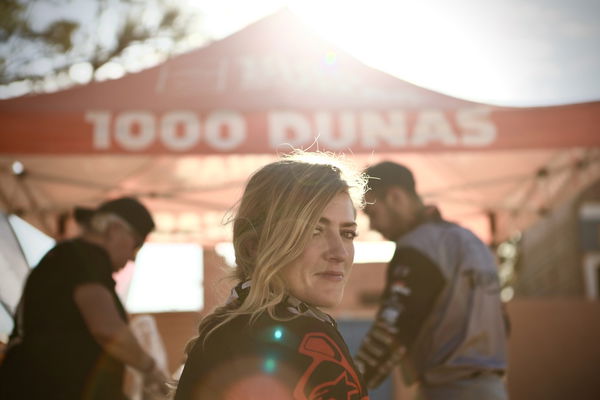
“I think one of the things that the rally industry struggles with is that a lot of people just see Dakar as rally, and nothing else counts,” she said. The collaboration of the FIM and FIA on the World Rally Raid Championship (W2RC, abbreviated such that it won’t cause confusion with that other rally series, the WRC) is a step towards trying to increase recognition of rallying as a whole, but its situation is not unique. The FIA World Endurance Championship is almost totally focused on the 24 Hours of Le Mans, the motorcycling equivalent series is dominated (to a lesser extent) by the Suzuka 8 Hours, and IndyCar by the Indy 500. So, the dominance Dakar has over rally raid is not an easy one to solve, but maybe it's also not one that rally wants to solve, necessarily.
“[But],” Ruck says, “there are so many epic rallies, actually far better than Dakar, all over the place, for all different levels.
“You don’t have to be a pro rider to go and do a rally, and I think it’s really important to try and get that message out there because there’s so much fun in rallying. The complexity road book gives you, of the mental navigation side of it, on top of the physical [side].”
As with all motorsport disciplines, cost is also an issue. However, Ruck points out that “There’s really achievable rallies as far as the costs of entry - Dakar you need thousands and thousands of pounds to do, [but] there’s a lot [of rallies] that people can enjoy without it having to be that.
“It’s not all about that one race. There’s a lot of very, very good races. The Morocco Desert Challenge, that I did, or the Tunisia Desert Challenge, arguably - and by people who have done the Dakar that were at that race - [have] harder terrain and harder navigation. So, you don’t get 600km of road section, but you’re still getting a serious fight.”
There is a sense that the rallies that aren’t the Dakar are almost given a secondary status. This is “unfair,” Ruck says, “because they’re really hard races. I mean, the Morocco Desert Challenge, I came 25th, which I’m really proud of. Of the 77 ‘moto’ category starters, 40 per cent finished. That’s a tough race. And you don’t have to sit on a road for five hours every day.”
Ruck’s path into motorcycling was perhaps unusual, as it was prompted by a collision while cycling.
“I do a lot of road riding,” Ruck says, “and I’ve very much overcome that fear (caused by the accident), but I still - nine years on [from the accident] - get moments where a car comes from the wrong direction and [it] takes me right back.”
The persistent and recurring trauma from her road accident is what made Ruck decide to pursue off-road motorcycling. “I got hit by a car, so I’m not the most favourable of the road side,” she said. “The ‘Sorry mate, I didn’t see you,’ doesn’t happen off-road.”
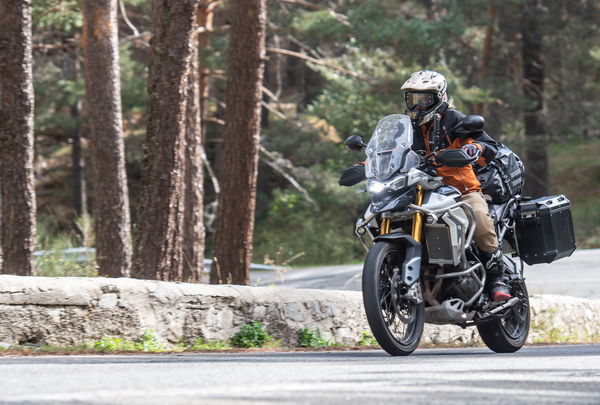
But off-road disciplines also play to Ruck’s personality. “Historically,” she said, “[I’m] an adrenaline junky. I did a lot of extreme sports, and I then got into motorbikes following my accident because a Harley[-Davidson] is a sofa with an engine, right?”
As Ruck’s condition improved during her recovery, she began to think about how she could combine her new love of motorcycles with her existing passion for extreme sports. “So, I decided to go off-road,” she said. “Very quickly I realised that it was absolutely disgusting - it’s hard, it’s sweaty, you’re swearing, and it’s brutal. But, I like that.”
Off-road riding also has more capacity for challenge and more diversity than riding on the road, both of which appealed to Ruck, and the latter point is something she has tried to exploit.
“I just went on a mission to try and learn and improve my skills as much as possible, trying different styles.
“So, getting on an adventure bike versus a trials bike, versus an enduro bike versus a rally bike - they’re all very different styles of riding, which give you different areas of skills, and which help each other.”
And this plays back to what Ruck considers her greatest motorcycling love: desert rallying. “I did 1000 Dunas (a seven-day rally from Spain to Morocco and back again) on a massive adventure bike last year. If I hadn’t done trials, there’s no way I’d have handled the rocky river beds on a bike that size, like the balance and the clutch control.”
Riding on smooth surfaces, even on a track, just doesn’t offer the same experience as the rough stuff for Ruck. According to her, the desert is “sadistic, brutal, sweaty, terrifying, and satisfying. [...] It’s my biggest lows and the hardest things I’ve done in my life. But it also then gives you the biggest highs, you know? The hardest fight normally gives you the biggest reward, and I think with desert rally, that massively comes from it.”
In comparison: “I’ve done a track day, and it was awesome,” she said. “I loved it, I got my knee down on multiple corners. But when you do off-road and the terrain is just throwing everything at you, the track isn’t quite as dynamic [as that].”
Desert racing also did something for Ruck that track riding or racing probably couldn’t, or at least desert racing did it in a way that would be difficult for track riding to match. Ruck says it brought her back into control of her life.
“When I finished the Tunisia Desert Challenge,” she said, “there was a really empowering moment where I realised that I’d kind of taken back control of my life.
“Until that point, the hardest thing I’d done was recover from the accident. But then, having finished that race, the hardest thing I’d ever done was actually my own choice, and it was really empowering taking back control that the hardest thing I’d done was something I’d chosen to do.”
